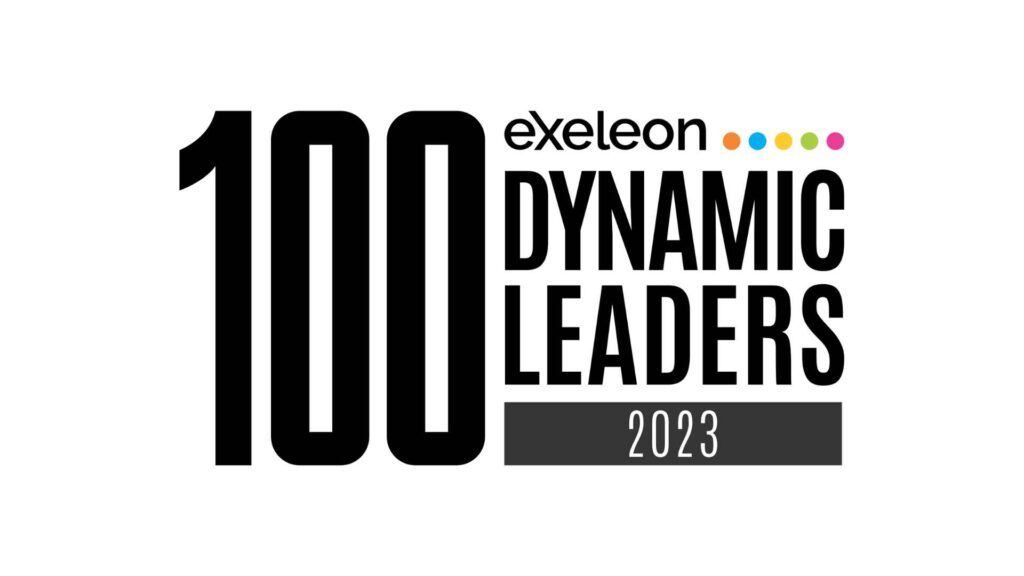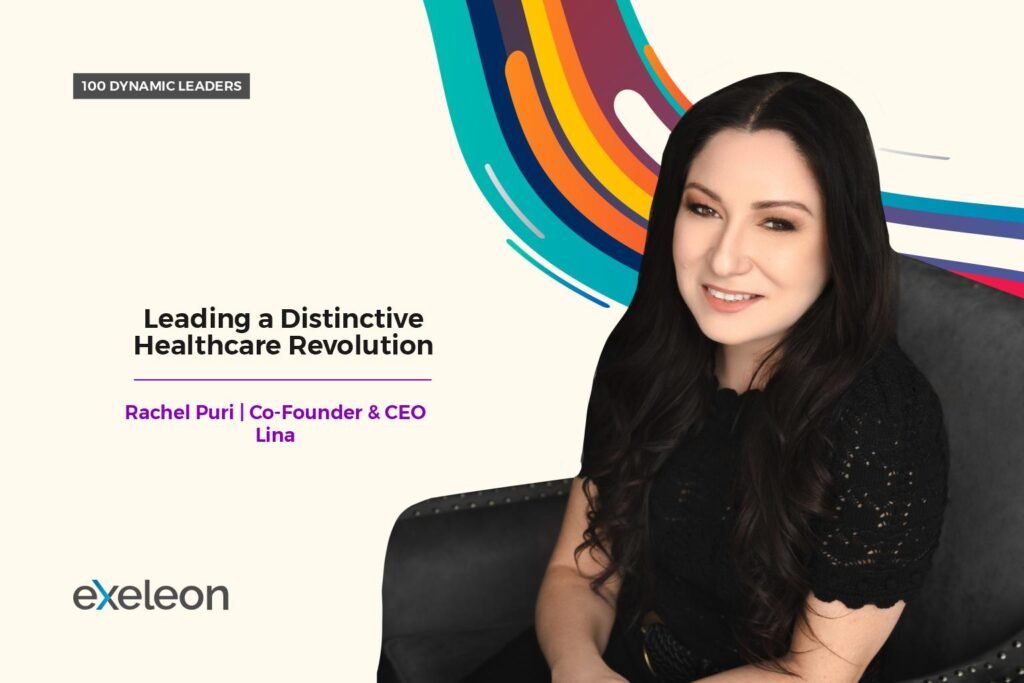This feature of Rachel Puri is part of Exeleon Magazine’s 100 Most Dynamic Leaders of 2023. Check out the entire issue and listing by clicking on this link.
Innovation is at the heart of creating breakthrough businesses. This means business leaders must constantly find new solutions for old problems; enabling them to ponder, to aspire, to explore and to uncover — often revealing valuable insights and spurring creativity.
One such ingenious leader that is moving the needle, especially in the world of healthcare, is Rachel Puri. Rachel is the Co-founder and CEO of Lina — a prominent medical coworking company built to empower independent health practitioners.
Sporting a beaming smile and calm confidence, she shares her perspective on what defines a leader: “I’d say besides authenticity, honesty and adaptability, openness and desire for constant learning are important qualities that make one a dynamic leader. I think a great leader must have these skills and the desire to build systems that set the stage for the team’s success.”
When it comes to her team at Lina, Rachel always places herself under a microscope. She questions how well she embodies the qualities of a leader for her team. “As a leader I strive to inspire, motivate, and support everyone on the team as much as possible.”
Learning the Ropes of Healthcare
Brought up in a family of medical professionals, Rachel began to gravitate towards healthcare from the early years of her childhood. Her grandmother was a family physician in Chisinau, Moldova while her mother spent over three decades working in the blood bank department of New York Presbyterian Hospital.
Inspired by her family’s pulse in this industry, she started her career in mental health, where she guided and counseled people with developmental disabilities. Subsequently, she pursued her master’s degree in International Affairs, specializing in public health. Yet, her curiosity for more hands-on clinical work persisted, one which led her to go back to school and earn a nursing degree.
“Working as a registered nurse in busy hospital units was one of the most rewarding professional experiences I have ever had and has taught me invaluable lessons that I carry with me to this day,” she mentions.
Revisiting her past, she remembers being fascinated by her family’s work which influenced many of her career choices and led her to where she is today. In fact, her company, Lina, is named in honor of her late grandmother, Polina, who passed away just six months before the launch of the company and continues to remain a constant source of inspiration in Rachel’s life.
Lina’s Liberating Mission
Operating a successful private practice is like navigating a complex maze, where every turn presents a new challenge. Rachel recognizes that independent healthcare practitioners face testing choices and sizable initial and recurring expenses — like hefty security deposits, expensive office equipment, long term office leases, office setup, maintenance of systems, equipment, staffing, compliance, marketing and much more.
This led her to lay the foundation for Lina along with her Co-Founder and Former CEO – Vicrum Puri. She recognizes that healthcare practitioners like doctors and therapists, in private practice, are overburdened as they struggle with unnecessary operational hiccups that lead them astray from what’s most important – patient care.
Remarkably, this is where Lina stands out as a pioneering and first-of-its-kind company to adopt a flexible office space model. Focused exclusively on the needs of healthcare providers, Lina is one of the rare coworking spaces that provides a cost-effective and sustainable way for practitioners to tend to their patients while retaining their independence.
Since the beginning, Lina has proved to be a soothing solution, easing burdens associated with launching, growing, and operating a private practice. Rachel elaborates, “Our innovative model eliminates steep overhead costs and minimizes time and energy spent managing an office and challenges unrelated to patient care. We pride ourselves in having created a space that offers freedom for practitioners to practice on their terms.”
Additionally, Rachel and her team are more than just a platform for professional growth; they are a haven where practitioners can bond with each other and form meaningful friendships and connections.
Furthermore, they have recently launched a Digital Lina Provider Directory, which spotlights each practitioner’s practice within the Lina community. This marketing support feature not only showcases the professionals’ practices but also helps attract new patients.
Rachel realizes the importance of this enhancement, “This meets a vital marketing need of many independent practitioners and we are thrilled to offer this additional layer of support to all healthcare practitioners at Lina,” she states.
Crafting Comfort for Healthcare Practitioners
Back in 2017, when Rachel and her partner Vic Puri, launched Lina, the concept of medical coworking did not exist.
“We created Lina because we identified a clear gap in the market. A whole segment of healthcare professionals was left out of the loop when it came to accessing flexible office space options,” she explains. She further notes that her partner’s extensive experience in Real Estate was instrumental in filling this market gap and building the company.
Traditional coworking spaces, although suitable for various professionals, fall short in meeting the unique office needs of healthcare professionals. Factors like soundproofing, privacy, patient confidentiality, specialized medical equipment and sinks, adherence to HIPAA and OSHA compliance, and more, were basic essentials that healthcare providers sought in their office spaces.
Lina’s spaces are carefully designed to meet the specialized office needs of medical professionals listed above, at a bare minimum. Rachel reveals, “While we also offer similar convenience and flexibility typically associated with a coworking space, our model expands far beyond these basics. From day one, our vision has been to create a space that alleviates the burdens of private practitioners and helps them focus on providing excellent care for their patients.”
This includes tasks like lease negotiations, setting up secure HIPAA-compliant Wi-Fi networks, managing office staff, and so many other important details that divert time, attention and energy away from patient care. “At Lina we focus on supporting our practitioner’s independence and autonomy to practice on their terms,” she adds.
Leading Beyond the Label
As the Co-founder and CEO of Lina, Rachel acknowledges that while she carries the weight of this title, her role is more pronounced.
She actively remains close to the daily operations, overseeing the company’s fundamental activities. While her daily routine is unpredictable, surprisingly this is what she loves the most about her role.
Another facet that Rachel is extremely proud of is her all-star team at Lina who are smart, committed and bring their best efforts to the mission of supporting healthcare practitioners and their patients. She emphasizes that at Lina, titles hold little significance and everyone, including her, wears several hats as they work collaboratively.
“Some days, I am in meetings all day, other days busy with admin work and my inbox. However, the days I love the most are those spent connecting one-on-one with some of our practitioners or meeting with my team where we brainstorm on new projects and initiatives to better support the practice needs of our practitioners” she explains.
Her Vision for the Future
Rachel envisions a fulfilling journey ahead, for herself and her team at Lina, recognizing the impact the pandemic had on everyone, especially healthcare practitioners.
Even before the pandemic, studies show that doctors were experiencing alarming rates of burnout, and these numbers are only going up. “We also know that quality of care is better, and cost of care is lower when received by independent healthcare providers, free to practice on their terms.”
Rachel believes that her team is spearheading a pivotal transformation, both in the healthcare and real estate sectors.
“Adapting a flexible office model to the needs of healthcare practitioners in private practice simply makes sense. At the very least, it is a more affordable and sustainable way for practitioners to provide care for their patients and may alleviate some of the other burdens and burnout healthcare providers are currently experiencing.”
In fact, Rachel’s team has developed this model that provides the space, community, and support for healthcare practitioners in private practice. They believe it can be extended and used across the United States, both in large metropolitan cities and smaller suburban neighborhoods alike.
“I have faith that this model has the potential to drive positive change in the healthcare industry. I am most excited about the future where we will see many more companies such as Lina offering healthcare practitioners a better way to operate their practices and care for their patients,” she concludes.











